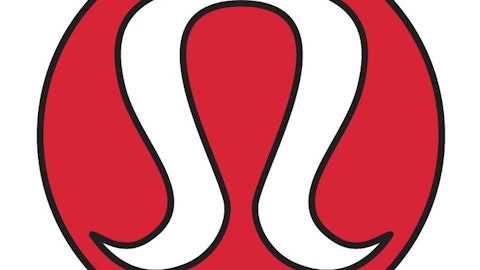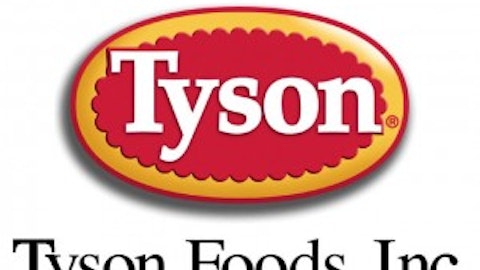As American consumers fret over the implications of the deal, retail investors and seasoned traders alike are lining up to play the planned merger between China’s state-run Shanghui International Holdings and pork producer Smithfield Foods, Inc. (NYSE:SFD). Although the terms of the deal appear to be quite favorable to Smithfield Foods, Inc. (NYSE:SFD), it presents a number of regulatory and financial questions that may not have easy answers. Due to the politically sensitive nature of the trans-Pacific merger, it is also subject to unusual regulatory hurdles, as well as swings in public sentiment that cannot be measured easily. As such, investors would be foolish to assume that this is a done deal.
However, there is a real possibility that this deal will go through. Such an outcome could be quite profitable for investors who position themselves correctly. In preparation, interested parties should take the time to compare Smithfield Foods, Inc. (NYSE:SFD) against its closest competitors.
Although Smithfield Foods, Inc. (NYSE:SFD) is the largest American pork producer by volume, it competes againstseveral other big-name companiesthat sell fresh and processed meat products in North America. These include Austin, Minnesota-based Hormel Foods Corporation (NYSE:HRL) and Springdale, Arkansas-based Tyson Foods, Inc. (NYSE:TSN) .
Thanks to their diversified asset portfolios and operational structures, both of these competing firms are larger than Smithfield Foods, Inc. (NYSE:SFD). At last check, Hormel Foods Corporation (NYSE:HRL)’s market capitalization came in at $10.4 billion, and Tyson Foods, Inc. (NYSE:TSN) sported a valuation of nearly $9 billion. By comparison, Smithfield Foods, Inc. (NYSE:SFD)’s post-announcement market capitalization is about $4.6 billion. Revenue-wise, Smithfield splits the difference between Hormel Foods Corporation (NYSE:HRL) and Tyson Foods, Inc. (NYSE:TSN). Its gross 2012 revenue figure of $13.1 billion exceeds that of Hormel Foods Corporation (NYSE:HRL) by about $5 billion and falls short of that of Tyson Foods, Inc. (NYSE:TSN) by around $20 billion. During the same period, Smithfield reported a final income of $233.6 million. By contrast, Hormel Foods Corporation (NYSE:HRL) earned around $500 million. Tyson Foods, Inc. (NYSE:TSN) eked out a relatively narrow profit of about $530 million.
Smithfield’s leverage is significant and could serve as a complicating factor for the proposed merger. In 2012, the company reported cash reserves of about $140 million and a debt load of about $2.4 billion. Tyson Foods, Inc. (NYSE:TSN) also has some debt troubles: during the same reporting period, the company disclosed a cash hoard of $809 million and about $2.4 billion in debt. Hormel Foods Corporation (NYSE:HRL) had a more even balance of $263 million in cash and $250 million in debt.
How the Deal Is Structured
Under the terms of the proposed merger, Shanghui will issue cashpayments of $34 per share to Smithfield shareholders of record as of a yet-to-be-determined date. Relative to Smithfield’s pre-announcement closing price, this represents a 25 percent premium. Although the company’s share price has fluctuated somewhat since the deal’s announcement, it remains about $1 per share lower than Shanghui’s offer price. As such, investors can still take advantage of a 3 percent arbitrage premium. Of course, this premium is dependent on the deal’s closing. In the event that the merger falls through, Smithfield’s value would likely fall to its pre-announcement levels.
Complicating Factors and Regulatory Issues
This relatively straightforward deal is made more complicated by the regulatory and political issues that surround it. By American standards, the food-safety record of China’s pork-processing industry is abysmal. Although Shanghui and Smithfield have both insisted that the combined company will adhere to the North American regulatory framework under which it must operate, rank-and-file customers are understandably nervous about the transition. Whether or not this is an overreaction, it could have a very real impact on the company’s bottom line. If American consumers temporarily or permanently shift their eating habits away from pork products, investors will be quick to pass judgment and could punish the combined firm’s shares accordingly.
Political opposition to the deal is another wild card. While it is likely that Shanghui and Smithfield will be able to assuage the safety concerns of American regulators, public opinion is not so easy to control. If widespread political opposition emerges, Smithfield may look for a face-saving way to exit the transaction. Unfortunately, other potential buyers for the company would likely face intense regulatory scrutiny due to the consolidated nature of the American pork industry.
Should Shareholders Bet on This?
At this point, it is unclear whether this deal will go through as planned. Investors who wish to profit from its arbitrage premium can use options to hedge their bets or employ tight stops to prevent significant losses. Although Chinese companies have previously been permitted to buy American companies that operate in less politically sensitive industries, the country’s food supply is a different matter. Ultimately, investors will need to use their own resources and experiences to analyze this situation and make an educated call on the likelihood of success.
Long-Term Outlook and Possible Plays
If this merger does close, it could affect North American prices for pork and other meat products while reordering the continent’s agriculture industry. Although it is too early to say whether this merger will force smaller producers out of business or encourage other players to enter the fray at higher price points, it is clear that the status quo will not continue. Investors who believe that this is a positive development would do well to look more closely at this deal.
In sum, Shanghui’s merger offer for Smithfield Foods creates a fascinating situation with many moving parts. Investors who wish to play this deal must carefully analyze the regulatory and political implications of Shanghui’s offer and determine whether the merger is likely to pass muster. Those who wish to play this deal should consider taking long positions in Smithfield Foods to capitalize on the still-extant arbitrage premium. However, due diligence is essential: Given the uncertainty that surrounds the merger, investors who fail to hedge their positions could find themselves in a heap of trouble.
Mike Thiessen has no position in any stocks mentioned. The Motley Fool has no position in any of the stocks mentioned. Mike is a member of The Motley Fool Blog Network — entries represent the personal opinion of the blogger and are not formally edited.
The article Will This Huge Chinese/US Deal Go Through? originally appeared on Fool.com is written by Mike Thiessen.
Copyright © 1995 – 2013 The Motley Fool, LLC. All rights reserved. The Motley Fool has a disclosure policy.





